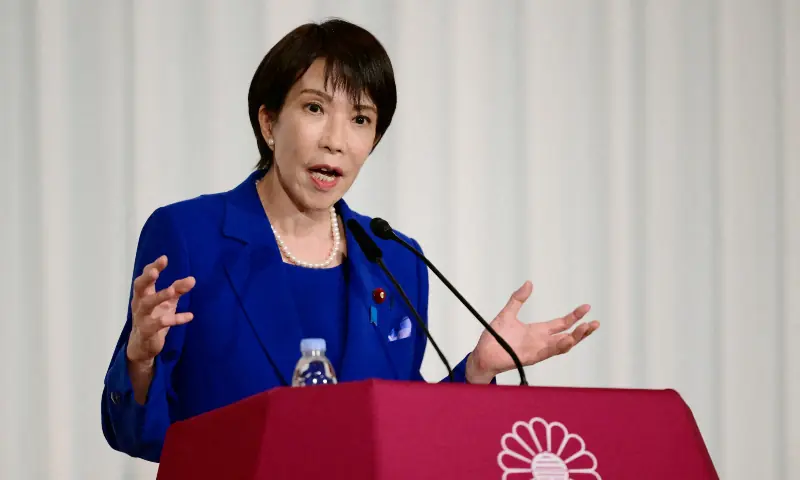Tokyo — Japan’s ruling Liberal Democratic Party (LDP) has chosen hardline conservative Sanae Takaichi as its new leader, positioning her to become the country’s first female prime minister in a historic and politically consequential moment for Asia’s second-largest economy. The 64-year-old veteran politician secured victory over her more moderate rival Shinjiro Koizumi in the party’s leadership race on Saturday, setting the stage for a parliamentary vote on October 15 to replace outgoing Prime Minister Shigeru Ishiba. Given the LDP’s dominant position in parliament, Takaichi is expected to win the vote and formally take office shortly thereafter.
Takaichi takes the helm of a party grappling with declining public support amid rising living costs and voter dissatisfaction. Opposition groups have gained traction by promising aggressive economic stimulus and tougher immigration measures, drawing younger voters away from the LDP. In her victory speech, Takaichi acknowledged the party’s struggles. “Recently, I have heard harsh voices from across the country saying we don’t know what the LDP stands for anymore,” she said. “That sense of urgency drove me. I wanted to turn people’s anxieties about their daily lives and the future into hope.”
A former economic security and internal affairs minister, Takaichi is a staunch supporter of late premier Shinzo Abe’s “Abenomics” policies, advocating for aggressive fiscal spending and loose monetary policy to boost growth. Her stance is expected to influence financial markets: analysts say her leadership makes it less likely the Bank of Japan will raise interest rates this month, a shift that had previously been considered probable.
Her economic views are paired with nationalist positions that could unsettle Japan’s neighbours. Takaichi regularly visits the controversial Yasukuni shrine honouring Japan’s war dead, a move that often angers China and South Korea. She has also expressed support for revising Japan’s pacifist postwar constitution and has floated the idea of forming a “quasi-security alliance” with Taiwan. Taiwan’s president, Lai Ching-te, welcomed her election, calling her “a steadfast friend of Taiwan” and voicing hopes for deeper cooperation in trade, security, and technology. South Korea issued a measured response, saying it hopes to “maintain the positive momentum” in bilateral relations.
Takaichi has also hinted at revisiting elements of an investment deal with U.S. President Donald Trump that traded lower tariffs for Japanese taxpayer-backed investments. The U.S. ambassador to Japan, George Glass, congratulated her and said he looks forward to strengthening the bilateral partnership “on every front.”
Domestically, her ascent is viewed by some as a breakthrough in Japan’s male-dominated political landscape. “The fact that a woman was chosen might be seen positively. I think it shows that Japan is truly starting to change,” said Misato Kikuchi, a 30-year-old company worker in Tokyo. But opinion polls suggest her socially conservative positions resonate more with male voters than women, and she will face the challenge of addressing growing support for the far-right Sanseito party, which has gained popularity by appealing to disaffected conservatives.
Echoing some of Sanseito’s rhetoric, Takaichi launched her campaign by recounting an incident in her hometown involving tourists disrespecting sacred deer, vowing to crack down on rule-breaking visitors and record numbers of immigrants. Sanseito welcomed her leadership, expressing hope that she would steer Japan in an “anti-globalism” direction.
Known for her intense work ethic and admiration for Britain’s Margaret Thatcher, Takaichi pledged to be an active international leader. “I have thrown away my own work-life balance, and I will work, work, work,” she declared. Her rise is expected to send ripples through both regional geopolitics and global financial markets as Japan navigates economic uncertainty, shifting alliances, and domestic political realignment.

